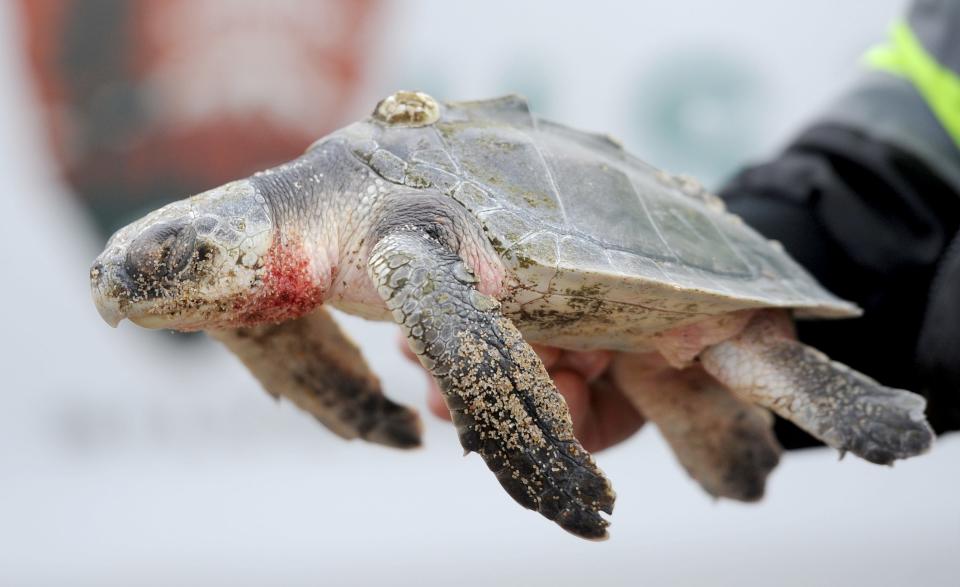Find a sea turtle on a Cape Cod beach this winter? Here's how to help
‘Tis the season, all along the beaches of Cape Cod, not for the holidays, but for stranded sea turtles.
People strolling the beaches, sightseeing or walking their dogs may spy pale green and pink dinnerplate-sized sea turtles lying upside down along the shoreline.
What sea turtles do you see on Cape Cod?
Most likely they are the Kemp's ridley species of sea turtles, ironically, said Mark Faherty, the science coordinator at Massachusetts Audubon Society's Wellfleet Bay Wildlife Sanctuary, the rarest sea turtle in the world, but the most commonly seen on Cape Cod.
Two other species commonly found stranded on the Cape are the loggerhead and green sea turtles.
All of these species have been designated as threatened or endangered under both the U.S. Endangered Species Act and the Massachusetts Endangered Species Act.

What happens to the sea turtles when the water is colder?
Each year, beginning right around Halloween and progressing into mid-November and even December, these sea turtles that thrive in warmer tropical waters get lost or, rather, trapped by the Cape’s hooked shape on the bay side as they journey south for the winter, according to Mass Audubon.
When they do, they are exposed to the colder waters — 55-50 degrees — and become what is called “cold-stunned.”
The turtles become lethargic and hypothermic. In this weakened state they are often blown by heavy winds or carried by the tides to the shore along the beaches and intertidal flats just above the high tide line.
If not rescued in time — and they remain in cold water or in the cold air — they can get pneumonia and die from exposure, said Faherty.
Here's what to do to help cold-stunned sea turtles
The Wellfleet Bay Wildlife Sanctuary is urging people to become aware and to take steps to save these turtles.
At beaches along Cape Cod, from Barnstable to Provincetown, signs have been posted with instructions.
Since the turtles are designated as endangered it is illegal to harass or transport them without a permit.
Mass Audubon has about 150 trained volunteers who are mandated responders who work under a U.S. Fish and Wildlife permit to handle and transport the turtles. Even those with the best intentions may not know what to do, so Massachusetts Audubon has provided simple steps to follow if you come across a stranded sea turtle this winter.
Do not put it back in the water
Carefully move the turtle above the high tide line, making sure never to grab or hold it by the head or flippers
Cover it completely with dry seaweed or wrack
Mark it with an obvious piece of debris (buoys, driftwood, branches, etc.)
Call the Wellfleet Bay hotline at 508-349-2615 x2
People who are not mandated responders may move the turtles to safety, as described above, but after that their only other responsibility is to call the hotline, said Faherty.
For safety reasons people are urged not to go into the water to retrieve floating stranded turtles.
“We want the turtles to come to you. Wait until they wash up on the beach and the flats,” said Faherty.
From there, volunteers will take over, gradually stabilize the turtles’ temperature and transport them in highly controlled conditions to the New England Aquarium in Quincy. Turtles may appear to already have died, but it is hard to tell, Faherty said. So people should assume they are alive and report the stranding, he said.
Can sea turtles survive if they are too cold?
Faherty said about 60% of the rescued stranded turtles survive.
Last year more than 900 sea turtle strandings were reported. Over the years this number has grown, but it often varies somewhere between a low of around 400 to the all-time high of 1200, Faherty said.
Visit massaudubon.org/seaturtles for more information about its sea turtle rescue program.
This article originally appeared on Cape Cod Times: Sea turtles found on Cape Cod beaches in winter may need your help

